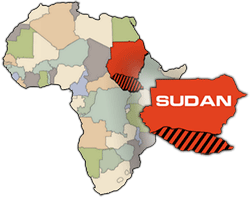|
Sudan Peace Process
 "South
Sudan is the area of Sudan below the 13th parallel and comprises
of Bahr-el-Ghazel, Equatoria and Upper Nile regions which is
about 400,000 square miles or twice the size of the state of
Texas in the United States. South Sudan has a kaleidoscopic
population of more than 10 million of which major ethnic groups
are the Dinka, the Nuer, the Azande, the Bari speaking, the
Otuho- speaking, the Toposa-speaking, Luo-speaking, the
Muru-speaking and the Maban-speaking (Chai). South Sudan is
bordered by the so called Arab and Muslim North Sudan, Chad and
Central Africa on the West, Zaire and Uganda on the South, and
Kenya and Ethiopia on the East. Although South Sudan is a
heterogeneous political culture, sociologically, historically,
culturally, and politically constitutes a nation-state (wiec
naath)."
Right of Self Determination: A Legal and Political Right for
South Sudan Professor David de Chand, , 6 August 1995 "South
Sudan is the area of Sudan below the 13th parallel and comprises
of Bahr-el-Ghazel, Equatoria and Upper Nile regions which is
about 400,000 square miles or twice the size of the state of
Texas in the United States. South Sudan has a kaleidoscopic
population of more than 10 million of which major ethnic groups
are the Dinka, the Nuer, the Azande, the Bari speaking, the
Otuho- speaking, the Toposa-speaking, Luo-speaking, the
Muru-speaking and the Maban-speaking (Chai). South Sudan is
bordered by the so called Arab and Muslim North Sudan, Chad and
Central Africa on the West, Zaire and Uganda on the South, and
Kenya and Ethiopia on the East. Although South Sudan is a
heterogeneous political culture, sociologically, historically,
culturally, and politically constitutes a nation-state (wiec
naath)."
Right of Self Determination: A Legal and Political Right for
South Sudan Professor David de Chand, , 6 August 1995
|
| February 2001 |
Report of
Centre for Strategic and International Studies on US Policy to end
Sudan's War
"Although the policy debate on Sudan
encompasses a myriad of issues, the CSIS task force concluded
that the central problem on which virtually everything else
hinges is the devastating war that has raged in Sudan since
1983. Now is an opportune and appropriate moment for the United
States to join actively in a strong multilateral push, in
collaboration with interested European powers, to end Sudan�s
internal war. A sine qua non to any future progress is the
cessation of the government of Sudan�s aerial bombardment of
civilian humanitarian sites in the south. Sudan continues to
matter significantly to U.S. interests�on human rights,
humanitarian, and security grounds. Washington cannot afford to
ignore Sudan�s extreme circumstances, rooted overwhelmingly in
Sudan�s 18-year internal war. The new administration is well
positioned to take a fresh look and move beyond a policy of
containment and isolation that has made little headway in ending
Sudan�s war, reforming Khartoum, or ameliorating Sudan�s
humanitarian crisis and gross human rights abuses.
Realistically, the only viable course to end Sudan�s war and see
progress in other critical areas is through a hard-nosed
strategy based on diplomacy, heightened engagement with all
parties, enhanced inducements and punitive measures, and
concerted multilateral initiatives.
In the past two years, Sudan�s rising oil production has
shifted the balance of military power in the government�s favor
at the same time that significant internal rifts have surfaced
in Khartoum. The surrounding region is in flux in its
relations to the Sudan conflict, and it has become clear that
competing regional peace initiatives hold no promise. In this
fluid context, the United States possesses significant leverage.
Among major powers, it is the lone holdout in renewing a
dialogue with Khartoum. Equally important, it is the principal
backer, in humanitarian and diplomatic terms, of the southern
Sudanese opposition, recognizes the south�s moral cause, and
will not countenance the military subjugation of the south..."
|
| 20 July 2002 |
Machakos Protocol - Recognising South Sudan's Right to Self
Determination |
| 23 July 2002 |
Sudan Peace
Accord & Sri Lanka - Adrian Wijemanne |
| 25 September 2003 |
Sudan
Agreement on Security Arrangements During the Interim Period,
September 2003 |
| 22 October 2003 |
Sudan's Peace Talks - Editor, Sangam |
| October 2003 |
Sudanese Experience: A lesson for Sri Lankan
peacemakers - Victor Rajakulendran |
| 31 December 2004 |
Comprehensive Agreement Between the Government of the Sudan (GOS)
and the Sudan People's Liberation Movement/Sudan People's Liberation
Army (SPLM/SPLA) |
| 31 December 2004 |
Agreement on Implementation Modalities of the Protocols and
Agreements including the Global Implementation Matrix, with
annexes and appendices. |
| 31 December 2004 |
Agreement on Permanent Ceasefire and Security Arrangements
Implementation Modalities between the Government of the Sudan (GOS)
and the Sudan People's Liberation Movement/Sudan People's Liberation
Army (SPLM/SPLA) during the pre-interim and interim periods |
| 31 December 2004 |
List of Abbreviations |